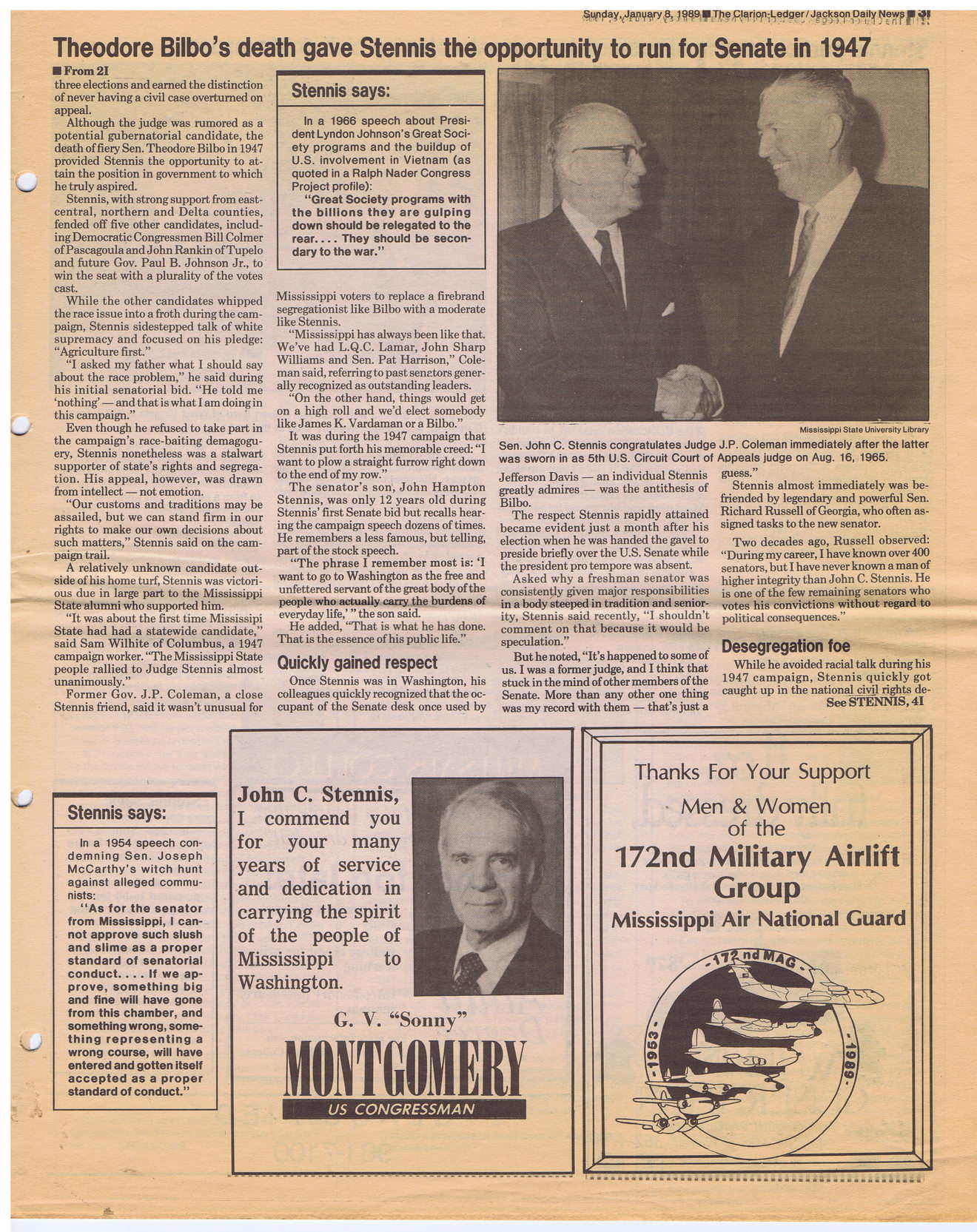This text was obtained via automated optical character recognition.
It has not been edited and may therefore contain several errors.
^lyifjay^^ary^ ThejpiqriP|n-l,edger/Jfgkson Dailjf Newpjp^p Theodore Bilbo’s death gave Stennis the opportunity to run for Senate in 1947 I From 21 three elections and earned the distinction of never having a civil case overturned on appeal. Although the judge was rumored as a potential gubernatorial candidate, the death of fiery Sen. Theodore Bilbo in 1947 provided Stennis the opportunity to attain the position in government to which he truly aspired. Stennis, with strong support from east-central, northern and Delta counties, fended off five other candidates, including Democratic Congressmen Bill Colmer of Pascagoula and John Rankin of Tupelo and future Gov. Paul B. Johnson Jr., to win the seat with a plurality of the votes cast. While the other candidates whipped the race issue into a froth during the campaign, Stennis sidestepped talk of white supremacy and focused on his pledge: “Agriculture first.” “I asked my father what I should say about the race problem,” he said during his initial senatorial bid. “He told me ‘nothing’ — and that is what I am doing in this campaign.” Even though he refused to take part in the campaign’s race-baiting demagogu-ery, Stennis nonetheless was a stalwart supporter of state’s rights and segregation. His appeal, however, was drawn from intellect — not emotion. “Our customs and traditions may be assailed, but we can stand firm in our rights to make our own decisions about such matters,” Stennis said on the campaign trail. A relatively unknown candidate outside of his home turf, Stennis was victorious due in large part to the Mississippi State alumni who supported him. “It was about the first time Mississipi State had had a statewide candidate,” said Sam Wilhite of Columbus, a 1947 campaign worker. “The Mississippi State people rallied to Judge Stennis almost unanimously.” Former Gov. J.P. Coleman, a close Stennis friend, said it wasn’t unusual for Stennis says: In a 1966 speech about President Lyndon Johnson’s Great Society programs and the buildup of U.S. involvement in Vietnam (as quoted in a Ralph Nader Congress Project profile): “Great Society programs with the billions they are gulping down should be relegated to the rear____They should be secon- dary to the war.” Mississippi voters to replace a firebrand segregationist like Bilbo with a moderate like Stennis. “Mississippi has always been like that. We’ve had L.Q.C. Lamar, John Sharp Williams and Sen. Pat Harrison,” Coleman said, referring to past senators generally recognized as outstanding leaders. “On the other hand, things would get on a high roll and we’d elect somebody like James K. Vardaman or a Bilbo.” It was during the 1947 campaign that Stennis put forth his memorable creed: “I want to plow a straight furrow right down to the end of my row.” The senator’s son, John Hampton Stennis, was only 12 years old during Stennis’ first Senate bid but recalls hearing the campaign speech dozens of times. He remembers a less famous, but telling, part of the stock speech. “The phrase I remember most is: ‘I want to go to Washington as the free and unfettered servant of the great body of the people who actually carry the burdens of everyday life,’ ” the son said. He added, “That is what he has done. That is the essence of his public life.” Quickly gained respect Once Stennis was in Washington, his colleagues quickly recognized that the occupant of the Senate desk once used by Sen. John C. Stennis congratulates Judge was sworn in as 5th U.S. Circuit Court of Jefferson Davis — an individual Stennis greatly admires — was the antithesis of Bilbo. The respect Stennis rapidly attained became evident just a month after his election when he was handed the gavel to preside briefly over the U.S. Senate while the president pro tempore was absent. Asked why a freshman senator was consistently given major responsibilities in a body steeped in tradition and seniority, Stennis said recently, “I shouldn’t comment on that because it would be speculation.” But he noted, “It’s happened to some of us. I was a former judge, and I think that stuck in the mind of other members of the Senate. More than any other one thing was my record with them — that’s just a Mississippi State University Library J.P. Coleman immediately after the latter Appeals judge on Aug. 16, 1965. guess.” Stennis almost immediately was befriended by legendary and powerful Sen. Richard Russell of Georgia, who often assigned tasks to the new senator. Two decades ago, Russell observed: “During my career, I have known over 400 senators, but I have never known a man of higher integrity than John C. Stennis. He is one of the few remaining senators who votes his convictions without regard to political consequences.” Desegregation foe While he avoided racial talk during his 1947 campaign, Stennis quickly got caught up in the national civil rights de-See STENNIS, 41 Stennis says: In a 1954 speech condemning Sen. Joseph McCarthy’s witch hunt against alleged communists: “As for the senator from Mississippi, I cannot approve such slush and slime as a proper standard of senatorial conduct.... If we approve, something big and fine will have gone from this chamber, and something wrong, something representing a wrong course, will have entered and gotten itself accepted as a proper standard of conduct.” John C. Stennis, I commend you for your many years of service and dedication in carrying the spirit of the people of Mississippi to Washington. G. V. “Sonny” MONTGOMERY US CONGRESSMAN Thanks For Your Support Men & Women of the 172nd Military Airlift Group Mississippi Air National Guard

NASA Research Document (007)